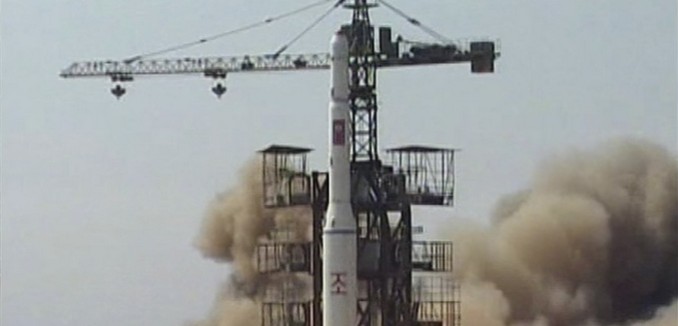North Korea’s launch of a long-range rocket over the weekend drew international condemnation, as well as growing concerns over the country’s military and nuclear cooperation with Iran.
North Korean authorities announced that its satellite entered orbit ten minutes after being launched via rocket. State television said that the launch had been ordered by dictator Kim Jung Un and that more rocket-powered satellite launches were planned.
South Korean legistators were told by the nation’s intelligence agency that the payload on the rocket was smaller than usual for satellites, so therefore “the launch should be treated as a ballistic missile test as the satellite it put into orbit would be useless,” the BBC reported. They were also reportedly told that North Korea had developed the necessary technology for intercontinental ballistic missiles, and that it was preparing another nuclear test to follow up on one that took place last month.
Secretary of State John Kerry called the launch a “flagrant violation” of United Nations resolutions and warned that the regime faced “significant measures to hold the DPRK [North Korea] to account.” The United Nations Security Council held an emergency session Sunday and “strongly condemned” the launch, saying that “a clear threat to international peace and security continues to exist, especially in the context of the nuclear test.” The Security Council has not imposed any new sanctions on North Korea for the January nuclear test.
Analysts have increasingly been raising the possibility that North Korea could be aiding Iran’s development of prohibited technologies, such as nuclear weapons or ballistic missiles.
Researchers from the Foundation for Defense of Democracies published a research paper (.pdf) in January outlining Iran’s past and present military dealings with North Korea, concluding that “the signs of military and scientific cooperation between Iran and North Korea suggest that Pyongyang could have been involved in Tehran’s nuclear and ballistic-missile program, and that state-run trading companies may have assisted in critical aspects of Iran’s illicit nuclear-related activities.” They added that more needs to be known about Iranian-North Korean cooperation, recommending a number of measures, including getting China more involved in non-proliferation efforts, increasing the study of locations where Iran and North Korea focus their efforts on procuring sanctioned technologies, and ensuring the transparency of the international financial system.
In How Iran and North Korea Became Cyber-Terror Buddies, which was published in the January 2015 issue of The Tower Magazine, Claudia Rosett reported on how Iran and North Korea’s cooperation in nuclear research may have been the basis for cooperation in other scientific areas, especially cyber-warfare.
Administration officials have also ducked questions regarding the possibility that Iran might be secretly engaged in nuclear activities with North Korea.
Sources less invested in downplaying Iranian abuses have raised the intriguing prospect that Iran and North Korea might be collaborating on cyber-warfare. A lengthy report released last August by Hewlett-Packard’s security research unit, titled “Profiling an Enigma: The mystery of North Korea’s cyber-threat landscape” explored the possibility. In a section on North Korea’s “Important political and military ties,” HP’s researchers noted, “While this report focuses on North Korea’s cyber-warfare capabilities, these capabilities cannot be fully separated from the implications of partnerships with countries known to deal in illegal weapons trade with the regime.” Noting that cyberspace has now become “an arena for warfare,” the HP report listed five nations that already have a record of weapons trafficking with North Korea, and are now “potential allies in the cyber realm”: China, Russia, Syria, Cuba, and Iran.
Among these candidates, the most natural partner is Iran. The governments of China and Russia might be willing to host North Korean hackers, but they are hardly in dire need of munitions and technology from Pyongyang. Syria and Cuba might be more interested, but have less to offer in return.
Iran, on the other hand, has flourishing cyber-warfare capabilities and substantial oil supplies. As such, it would seem to offer many opportunities for mutual gain. Iran and North Korea have long been involved in illicit trade, Pyongyang is short on cash and long on munitions, and Iran has oil wealth to spend, as well as a documented appetite for North Korean goods.
[Photo: The Times of India / YouTube ]




